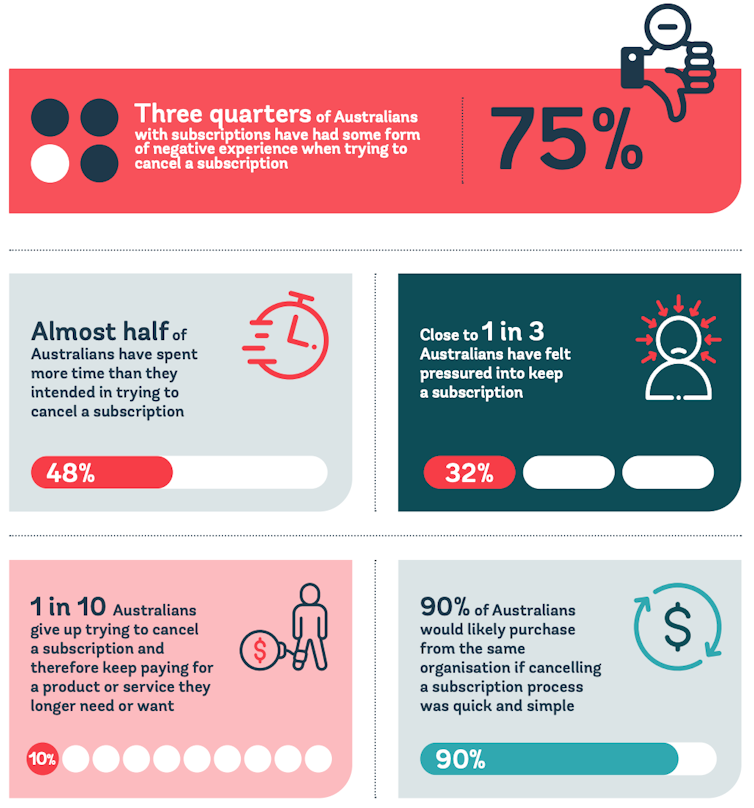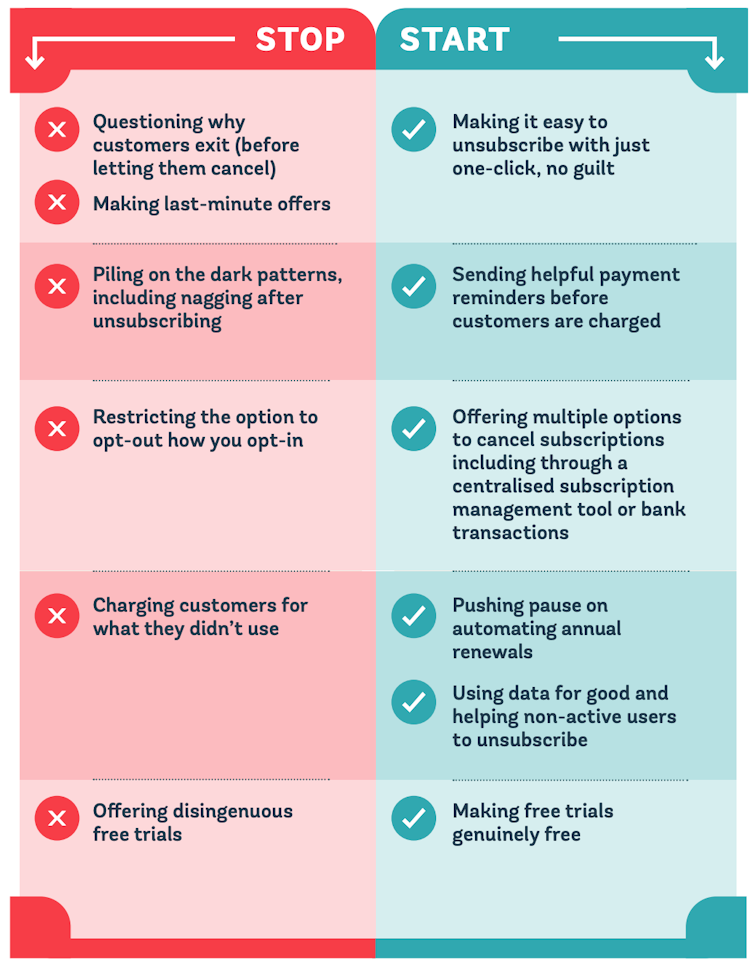
Many businesses are trapping Australian consumers in paid subscriptions by making them hard to cancel, hiding important details and offering “free” trials that auto-renew with hefty charges. We need law reform to tackle this continuing problem.
A new report shows 75% of Australian consumers have had negative experiences when trying to cancel a subscription, according to the Consumer Policy Research Centre (CPRC).
It shows businesses use “dark patterns”, which are designs that hinder consumers who try to act in their own best interests. Subscription traps are often called “Hotel California” techniques, referring to The Eagles’ famous lyric: “you can check out any time you want, but you can never leave”.
In some of these cases, consumers may have remedies under our existing consumer law, including for misleading conduct. But we need law reform to capture other unfair practices.
In the meantime, the CPRC’s research also gives examples of businesses with fair, consumer-friendly subscription practices. These also benefit the business.
Examples of unfair subscription traps
Subscription business models have become common – many products are now provided in the form of software, an app or access to a website. Some of these would once have been a physical book, newspaper, CD or exercise class.
Most people who use online services have experienced the frustration of finding a credit card charge for an unwanted, unused subscription or spending excessive time trying to cancel a subscription.

Businesses can make it difficult for consumers to stop paying for unwanted subscriptions. Some do this by allowing consumers to start a subscription with a single click, but creating multiple obstacles if you want to end the subscription.
This can include obscuring cancellation options in the app, requiring consumers to phone during business hours or making them navigate through multiple steps and offers before terminating. The report points out many of the last-ditch discounts offered in this process are only short term. One survey respondent said:
I wasn’t able to cancel without having to call up and speak to someone. Their business hours meant I had to call up during my work day and it took some time to action.
Other businesses badger consumers with frequent emails or messages after they cancel. One respondent said a business made “the cancellation process impossible by making you call and then judging your reason for cancellation”.
What does consumer law say?
Some subscription traps already fall foul of the Australian Consumer Law and warrant investigation by the Australian Competition & Consumer Commission (ACCC). Consumers may have remedies where the business has engaged in misleading conduct or imposes an unfair contract term.
For example, the ACCC is suing dating site eHarmony for its allegedly misleading subscription practices.
In the United States, the Federal Trade Commission has filed a complaint against software company Adobe for allegedly using dark patterns in its subscription practices.
The Federal Trade Commission has alleged that “Adobe pushed consumers toward the ‘annual paid monthly’ subscription without adequately disclosing that cancelling the plan in the first year could cost hundreds of dollars”.
Adobe issued a statement arguing the commission’s complaint “mischaracterises” its business. The litigation is ongoing.
We need an unfair practices prohibition
Some subscription traps would fall outside the existing consumer law. This is because they don’t meet the test for misleading conduct or unfair contract terms, but make it practically very difficult to cancel.
The ACCC has advocated for Australia to follow other countries such as the United Kingdom and the United States to enact an unfair practices prohibition to capture conduct like this.

Better practices benefit businesses too
The CPRC report also revealed that 90% of Australians would likely purchase from the same organisation if cancelling a subscription process was quick and simple.
Businesses focused on a short-sighted cash grab fail to realise that consumers might cancel but later return if treated well.
The CPRC highlights businesses that are doing a good job. For instance, the habit change app Atoms (based on James Clear’s book Atomic Habits) has a genuinely free trial. It doesn’t require credit card details, doesn’t auto-renew, and lets consumers know how many trial days remain.
The CPRC says the charity World Vision doesn’t auto-renew annual sponsorships, but reminds supporters about when the sponsorship will lapse.
Importantly, some businesses – such as Netflix – use their data for good in this context. They notice when users are paying for the service without using it and help them unsubscribe.
These practices should be applauded. But we need an unfair practices prohibition for businesses who don’t follow suit and recognise the long-term benefits of treating customers fairly.
Katharine Kemp is a Member of the Expert Panel of the Consumer Policy Research Centre.
This article was originally published on The Conversation. Read the original article.







